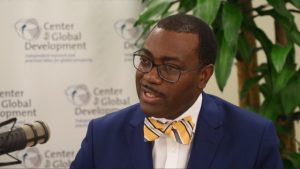Some countries and International institutions have pledged to support the channeling of Special Drawing Rights (SDRs) through Multilateral Development Banks (MDBs).
A statement issued by the African Development Bank (AfDB), said that the bank with the Inter-American Development Bank (IDB) raised the proposal for channelling of the SDRs.

The statement listed the countries to include, France, Japan, Spain, the United Kingdom, Brazil (the incoming G20 Presidency).

It listed the institutions to be the International Monetary Fund (IMF), United Nations, Ministers from Africa and Latin America, the Asian Development Bank and other international institutions.
The participants made the commitment at a special roundtable convened at the COP28 in Dubai, hosted by the COP28 Presidency, AfDB, IDB and Government of France.
It said the meeting, which was co-hosted by the Government of Japan, with support from the Rockefeller Foundation, would discuss leveraging SDRs for climate and development.

Speaking at the roundtable, the AfDB’s President, Dr Akinwumi Adesina, reiterated the benefits of channeling the SDRs through MDBs.
He said, “MDBs can multiply the channeled SDRs by at least four times their original values. This multiplier effect means that five billion dollars of channeled SDRs can be transformed into 20 billion dollars of new financing.
“This will transform the SDRs from static foreign reserve assets into dynamic lending instruments at affordable costs to finance development.
“While preserving their reserve asset status and be at zero cost to taxpayers in SDR-rich countries.”
Also speaking, the IDB President Ilan Goldfajn highlighted the important progress in the discussion around SDRs channeling.
“Special Drawing Rights are critical in helping us advance our climate agenda, and to scale up investments for climate mitigation and adaptation in our member countries.
“We welcome the progress made towards the rechanneling of SDRs with the liquidity pledges by France, Japan, the UK, and Spain through the SDR hybrid capital instrument and the IMF’s readiness to send a proposal to its Executive Board soon.
“Going forward, it will be crucial to have the commitment of at least five more investors to make this instrument a reality and start channeling SDRs through MDBs,” Goldfajn said.
Similarly, the IMF Deputy Managing Director, Bo Li congratulated the two banks for developing a concrete proposal.
He said, “based on our staff assessment, the hybrid capital instrument proposed by AfDB and IDB will meet the reserve asset quality requirements.
“Successful implementation of the proposal will be an important contribution to amplify the positive impact of the historic 2021 SDR allocation for the benefit of developing countries,” Li said.
He said that the IMF was working at pace to finalise all required approvals, with these processes already well advanced and expected to be completed and sent to the board in the near future.
The government of Japan announced that it would be accelerating its best efforts to make a contribution to the proposed hybrid capital.
The country’s Deputy Director-General in the Ministry of Finance Tomoyoshi Yahagi said the proposal by the two banks was a great opportunity by MDBs to show strong partnership with their member countries.
Yahagito said it would enable the countries to deliver the most needed financial resources to achieve Sustainable Development Goals (SDGs).
The Director-General of the French Treasury Emmanuel Moulin said from the beginning, his country had been a strong supporter of SDR reallocation.
“AfDB and IDB have put forward a very solid proposal for the channeling of SDRs through a hybrid capital instrument with the help of IMF for the benefit of countries most in need.
“France is ready to support the SDR hybrid capital proposal through the Liquidity Support Agreement, by providing a guarantee,” Moulin said.
Spain’s First Deputy Prime Minister and Minister for Economy, Trade and Enterprises, Nadia Calvino who also chairs the International Monetary and Financial Committee, IMF, expressed her country’s support for the SDR initiative.
“Spain has been in the lead to reinforce the firepower of multilateral institutions and the creation of new instruments which are fit for purpose.
“Channeling SDRs is one of the instruments we should work on,” Calvino said.
The United Kingdom commended the AfDB and the IDB for these innovative proposals to maximise the value of SDR channeling.
The UK’s Minister of State for Development and Africa, Andrew Mitchell, said his country would be exploring the possibility of augmenting the SDR facility with a liquidity support agreement.
“The UK is a firm champion and supporter of the AfDB and its outstanding president.
“And I sincerely hope that with further detailed work, this channeling proposal can be delivered, benefiting those countries most in need of support.”
The UN’s Under Secretary-General for Economic and Social Affairs, Li Junhua said the proposal by the AfDB and the IDB deserved all our support.
“The UN calls on countries with unused SDRs to show their support and conclude contribution agreements with the AfDB and the IDB,” he said.
The Government of Brazil confirmed that efforts to rechannel SDRs through MDBs to expand climate and development finance will form part of the agenda for their G20 Presidency.
Sir Alok Sharma, a Climate and Finance Fellow at the Rockefeller Foundation and the former COP26 President, said, “we can overcome the technical barriers. This event demonstrates a vital ingredient; political will.
“We all talk about the millions, the billions, and the trillions, but that doesn’t mean anything to people living on the front lines of climate change.
“This is about supporting the most vulnerable people in the world. Please do not fail them.”
Alvaro Lario, the president of the International Fund of Agricultural Development, said, “the solutions have been provided and what is now needed is the political breakthrough.”
Supportive remarks were also made by senior government officials from Kenya, Senegal, Brazil, Argentina, and the Asian Development Bank.
The IMF issued a historic general allocation of SDRs worth $650 billion in 2021 to help countries deal with the impact of a global crisis triggered by the COVID-19 pandemic.
Africa, with a population of more than 1.2 billion, received only $33 billion, representing about five per cent of the total allocation, the smallest portion among the different regions of the world.
Similarly, Latin America and the Caribbean received only eight percent of the total allocation.
The African Union at its meeting of Heads of State in February 2022, urged wealthy nations to increase the SDR allocation to the continent to at least $100 billion and channel part of them through the AfDB.
The channeling of SDRs through the MDBs strongly aligns with and was incorporated into the MDB Vision Statement issued at the Summit on the Paris Pact for People and Planet held in June 2023.
The AfDB and the IDB developed an innovative mechanism that would be structured as a hybrid capital instrument and can, therefore, be accounted for as equity on the AfDB’s and IDB’s balance sheets.
It is also underpinned by a Liquidity Support Agreement between contributing shareholders to ensure that SDR-contributing countries can still account for these as reserves.

